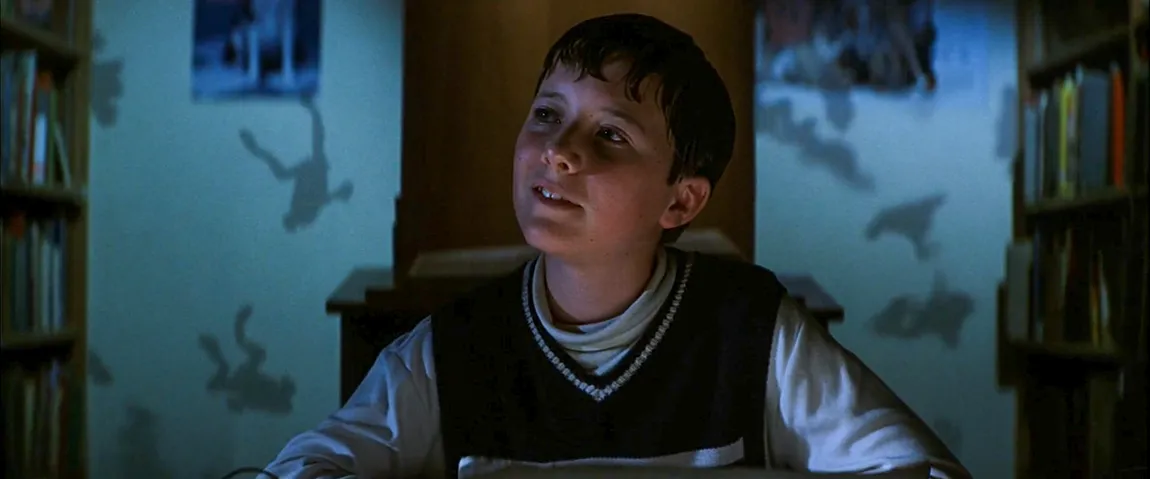The cataclysmic, apocalyptic rain of frogs in Magnolia is met with a bunch of a entirely justified reactions, from panic to Phil’s paralyzing bewilderment.
Newest Essays
“but it did happen”: The Importance of Four Words in the Corner
Kiss, Interrupted: “Say it, Jimmy”/“Just let me go, Jim”
The Unseen Ending: The Death of Jimmy Gator
An Active God, Acts of God: Dixon as an Agent of the Divine
The Kid in the Hall: An Introduction on a Prologue
Prisoner and Preacher: Earl Partridge
Why Are There Frogs Falling from the Sky?
It might as well be an admonition to the audience, because casual acceptance is the only real option outside of rejecting the movie. I don’t think Magnolia offers, in the moment, any way to process or understand the frogs.
And many people, I suspect, never get beyond “This is something that happens.” I led a small-group discussion on Magnolia in 2006, and nobody had any problem with the amphibians, and nobody ascribed a grand meaning to them.
Stanley is a child, though, and it’s dangerous to confuse his extensive knowledge of trivial facts with wisdom. His statement comes in direct opposition to the words of the movie’s infrequent narrator, who admonishes the audience in the prologue not to brush off coincidences and strange events: “This is not just ‘something that happened.’ This cannot be ‘one of those things.’”
So: What are we to make of the frogs?
Most Christians and Jews will recognize the frogs as a motif from Exodus. In case that wasn’t clear, Anderson fills Magnolia with the numbers eight and two and several explicit references to Exodus 8:2. (That verse reads: “And if thou refuse to let them go, behold, I will smite all thy borders with frogs.”) The frogs are one of the plagues that visit Egypt as God tries to compel Pharaoh to release the Israelites from enslavement.
You probably knew lots of those things, but that basic background doesn’t illuminate what the frogs mean, or why they’re so prominently featured in a seemingly irreligious movie.
Magnolia has but one devout character — police officer Jim Kurring — and the movie implicitly mocks him as a simpleton whose piety seems contingent on favorable treatment from God. When he loses his gun, he thinks the Lord has abandoned him and begs for help. Kurring is good-hearted but not rigorous in his faith.
And the movie is populated with lost, lonely people. They’re miserable, and many of them are wicked to boot – hypocrites, addicts, adulterers, misogynists, and bullies. These characters are so far gone that only something nearly miraculous could awaken them from their moral and spiritual slumber. God’s weapon of choice? Frogs.
You might dispute the divine source of the frogs, noting that reports of natural frog precipitation are hardly unprecedented. But the movie offers no hint of a rational explanation.
More importantly, a scientific accounting for the frogs would render them meaningless as a narrative device. The amphibian downpour would merely be, in Stanley’s words, “something that happens,” no different from a spectacularly heavy rain. And if the frogs are insignificant beyond assisting the plot, then Magnolia must be a terrible, lazy movie. Either the frogs are an essential, pregnant component of the film, or they ruin it.
I subscribe to the former view, and the only way to justify the frogs is to bring God into the picture — the jealous, angry, ostentatious Lord of the Old Testament. Sometimes you gotta break out the big guns, particularly when people are this spiritually dead. Or, as Dixon raps in the movie, “When the sunshine don’t work, the good Lord bring the rain in.”
And once you grab their attention through Old Testament means, you can start working toward New Testament ends. The climatic fury leads to small, human breakthroughs.
“You have to be nicer to me,” Stanley says to his father. He’s rebuffed — twice — but he has asserted himself with his abuser.
Rose has spent the night comforting Claudia, finally siding with her daughter instead of blindly standing by her husband.
Jim sits with Donnie, accompanies him to the store to return what he stole, and sends him on his way instead of arresting him. “Sometimes people need a little help,” Jim says to himself, weighing the rules of his job against the teachings of his faith. “Sometimes people need to be forgiven.”
And Frank visits the hospital to see Linda — the stepmother he’s almost certainly never met, the decades-younger replacement for his abandoned mother, the pointed reminder of all his father’s sins.
But before we see any of that, we see two bodies carted out of the Partridge house, and Phil gently offering Frank the opportunity to talk to the people from the hospital.
He walks away, busies himself with Earl’s bed, and begins to cry.
Sweet Phil Parma — the only Magnolia character to show empathy, compassion, and kindness, the only one who didn’t need frogs to wake him up, and the embodiment of Christian generosity — cries.
Phil wept.
This is a revision of an essay originally published in 2007. The reference to Dixon’s rap was added after a commenter on that piece noted the foreshadowing.

